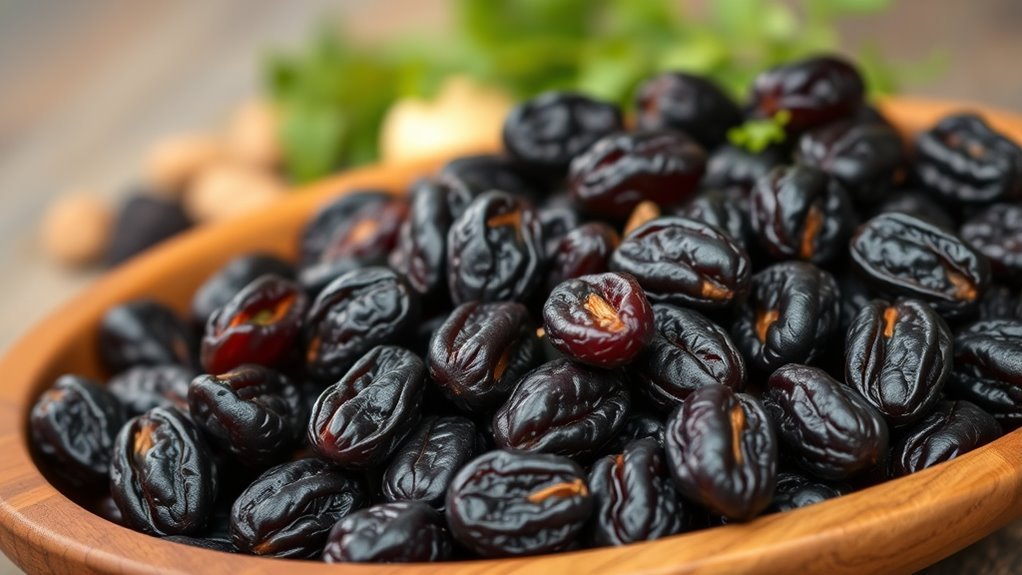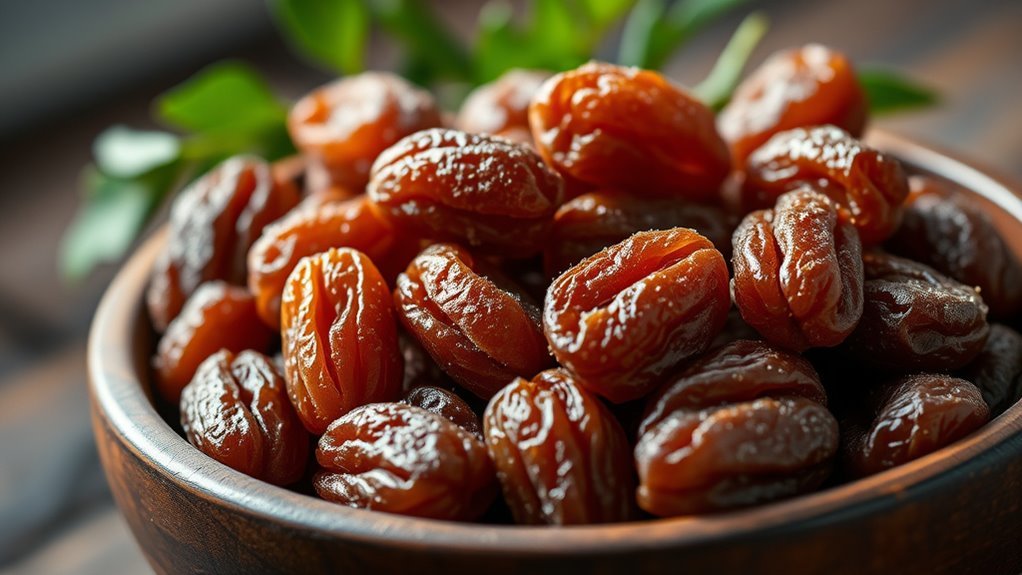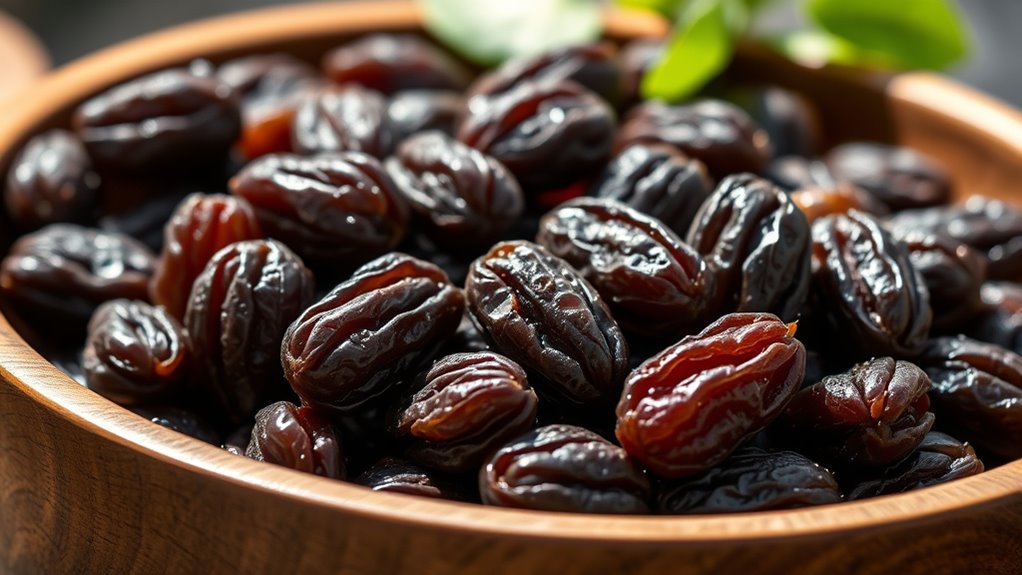Raisins aren’t keto-friendly due to their high carbohydrate content, with around 79 grams per 100 grams. This exceeds the typical keto limit of 20-50 grams of carbs per day. They also have a high glycemic index, which can cause rapid spikes in blood sugar. If you’re monitoring your carb intake, it’s essential to practice portion control, perhaps enjoying just a small amount. There are healthier alternatives available that align better with a ketogenic lifestyle.
Nutritional Profile of Raisins

When it comes to understanding the nutritional profile of raisins, it’s vital to take into account their composition. Raisins are packed with important nutrients, making them a nutrient-dense snack option. They provide a significant amount of dietary fiber, which aids digestion, and they’re rich in antioxidants that can help combat oxidative stress. Additionally, you’ll find minerals like potassium, iron, and calcium, contributing to overall health. The raisin benefits extend to energy provision due to their natural sugars, making them a quick fuel source. However, while they offer numerous health advantages, it’s important to consume them in moderation, especially if you’re monitoring carbohydrate intake. Balancing their nutrient density with your individual dietary needs can help you enjoy their benefits responsibly.
Carb Content and Ketogenic Guidelines

Raisins, while nutrient-dense, contain a significant amount of carbohydrates, which makes them a concern for those following a ketogenic diet. If you’re adhering to keto guidelines, you’ll want to be mindful of your carb intake, typically limited to 20-50 grams per day. Here’s a quick look at how raisins stack up against common keto snacks:
| Food Item | Carbs (per 100g) | Keto-Friendly? |
|---|---|---|
| Raisins | 79g | No |
| Almonds | 10g | Yes |
| Cheese | 1g | Yes |
| Celery | 3g | Yes |
Given these diet restrictions, it’s clear that while raisins are healthy, they don’t align well with a ketogenic lifestyle.
Impact on Blood Sugar Levels

When considering raisins on a keto diet, it is crucial to look at their glycemic index and carbohydrate content, as these factors greatly influence blood sugar levels. Raisins have a relatively high glycemic index, which means they can cause a quicker rise in blood sugar compared to other low-carb options. Understanding the insulin response to these sugars can help you make informed decisions about their role in your diet.
Glycemic Index of Raisins
The glycemic index (GI) of raisins, which measures how quickly a food raises blood sugar levels, is an important factor to contemplate for those following a ketogenic diet. Raisins have a moderate GI, indicating that they can cause a notable glycemic response. When you consume raisins, your body breaks down the sugars, affecting your sugar metabolism. This can lead to rapid spikes in blood sugar, which is something you’ll want to manage on a keto lifestyle. While they offer some nutritional benefits, their impact on blood sugar levels may not align with your goals of maintaining ketosis. Understanding the GI of raisins empowers you to make informed choices, helping you stay on track with your dietary preferences.
Carbohydrate Content Overview
While it’s tempting to snack on raisins for their natural sweetness, their carbohydrate content is a crucial consideration for those aiming to manage blood sugar levels on a ketogenic diet. Different raisin varieties, such as dark, golden, or sultana, all share a similar trait: high sugar content. A standard serving can contain around 30 grams of carbohydrates, primarily from sugars like glucose and fructose. This significant carbohydrate load can quickly impact your blood sugar, making it challenging to stay within the low-carb limits essential for ketosis. If you’re committed to a keto lifestyle, moderation is key, and exploring alternative snacks with lower sugar content can help you maintain your desired freedom without compromising your dietary goals.
Insulin Response Analysis
Although raisins might seem like a healthy choice due to their natural origins, their high sugar content can lead to significant insulin responses, impacting blood sugar levels. When you consume raisins, the sugars can spike your glucose levels, triggering an insulin release. This response may challenge your insulin sensitivity, especially if you’re aiming to maintain stable blood sugar levels. For those focused on keto or low-carb lifestyles, understanding glucose metabolism becomes vital. A rapid increase in insulin can hinder fat burning and lead to cravings. While you might enjoy raisins in moderation, it’s important to evaluate their effects on your body’s insulin response and how they fit into your overall dietary goals. Balance is key to making informed choices.
Portion Control and Moderation
When it comes to incorporating raisins into a keto-friendly diet, portion control and moderation are essential. While these tiny fruits can satisfy your sweet tooth, they’re also high in natural sugars, which can bump you out of ketosis if you’re not careful. Practicing mindful eating helps you stay aware of portion sizes, allowing you to enjoy raisins without overindulging. A typical serving size is about a tablespoon, which contains around 5-6 grams of carbs. By keeping your portions small, you can savor their flavor while still adhering to your keto goals. Remember, it’s all about balance; enjoy raisins occasionally, but be mindful of how they fit into your overall daily carb limit.
Healthier Alternatives to Raisins
If you’re looking for healthier alternatives to raisins that fit within a keto-friendly framework, consider options like nuts, seeds, or unsweetened coconut flakes. Nuts and seeds are packed with healthy fats and protein, making them satisfying choices. Unsweetened coconut can add a delightful texture and flavor without the carbs. Dried cranberries can be enjoyed in moderation, but make sure they’re sugar-free to keep your carb count low. You might also love pairing chia seeds with nut butter for a nutritious snack that’s rich in omega-3s and fiber. Additionally, indulge in sugar-free chocolate for a sweet treat that aligns with your keto goals. These alternatives can help you maintain your lifestyle while enjoying delicious flavors.
Incorporating Raisins Into a Keto Diet
While raisins are often considered high in sugar and carbs, they can still be incorporated into a keto diet in moderation. You can enjoy them as a sweet addition to your keto snacks, but keep portion sizes in check. A small handful can provide flavor and satisfaction without derailing your progress. Consider using raisins in creative raisin recipes, like keto-friendly trail mixes or as a topping for salads, to add depth to your meals. Pair them with nuts or seeds to balance the sweetness and enhance the healthy fats in your diet. Remember, moderation is key—finding the right balance allows you to enjoy the unique taste of raisins while staying in line with your keto goals.
Frequently Asked Questions about Raisins and Keto Diet
1. Are raisins keto-friendly?
Raisins are generally not considered keto-friendly due to their high carbohydrate content. A small serving of raisins (about 1 ounce) contains approximately 22 grams of carbohydrates, which can significantly impact your daily carb limit on a ketogenic diet. Most keto diets recommend keeping daily carb intake below 20-50 grams, making it challenging to include raisins without exceeding this limit.
2. What is the carbohydrate content of raisins?
Raisins are concentrated dried grapes, and as such, they have a high carbohydrate content. In a typical serving size of 1 ounce (about 28 grams), there are around 22 grams of carbohydrates, including about 1 gram of dietary fiber. This means the net carbs can be approximately 21 grams per ounce, which is quite high for those following a strict ketogenic diet.
3. Can I eat raisins in moderation on a keto diet?
While it is theoretically possible to fit a very small amount of raisins into a keto diet, it is generally not advisable. Eating even a small portion could take up a significant portion of your daily carb allowance. If you choose to consume raisins, it’s essential to measure your intake carefully and consider other lower-carb fruits or snacks that may fit better within a keto framework.
4. What are some keto-friendly alternatives to raisins?
If you’re looking for keto-friendly alternatives to raisins, consider options like unsweetened coconut flakes, nuts (such as almonds or walnuts), or seeds (like pumpkin or sunflower seeds). These alternatives are lower in carbohydrates and can provide similar textures or flavors in recipes where you might have used raisins.
5. What fruits are considered keto-friendly?
Keto-friendly fruits are generally those that are lower in sugar and carbohydrates. Examples include berries (such as strawberries, raspberries, and blackberries), avocados, and olives. These fruits can be enjoyed in moderation on a keto diet due to their lower glycemic index and lower overall carb content compared to fruits like bananas or grapes.
References
- https://www.healthline.com/nutrition/are-raisins-keto-friendly
- https://www.medicalnewstoday.com/articles/317434
- https://www.ncbi.nlm.nih.gov/pmc/articles/PMC7071162/
- https://www.ketogenic.com/what-are-raisins
- https://www.verywellfit.com/are-raisins-keto-friendly-5181701
- https://www.nutritionvalue.org/Fruits/Raisins_nutrition.html


